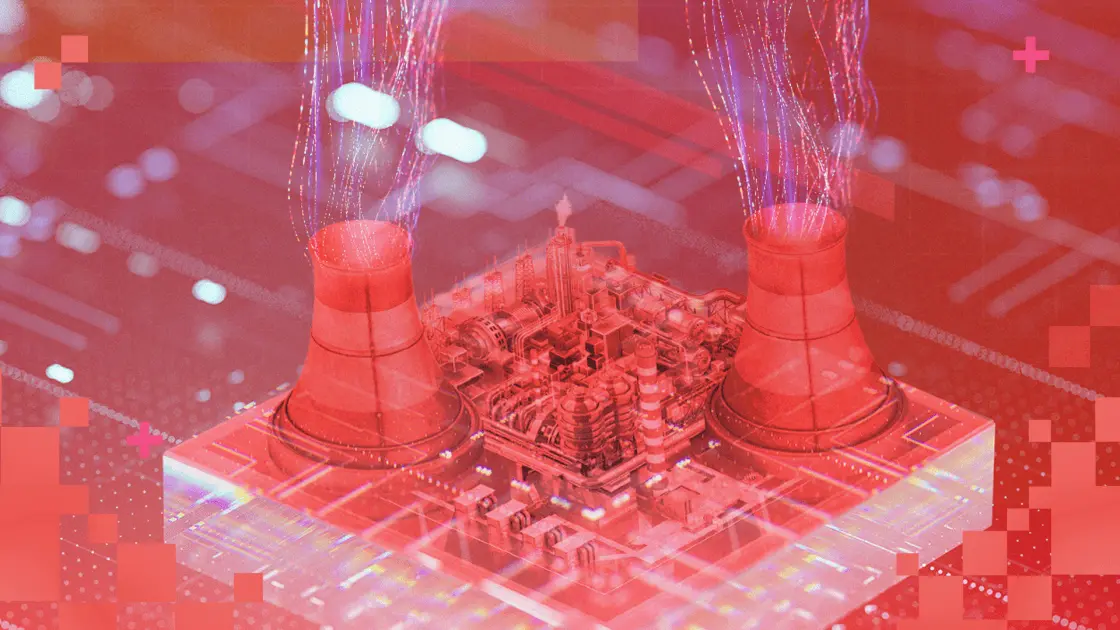Nuclearn Secures $10.5M to Revolutionize Nuclear Industry with AI
2 Sources
2 Sources
[1]
Exclusive: Nuclearn gets $10.5M to help the nuclear industry embrace AI
Companies that have dug deep into AI have fallen in love with nuclear power for its promise of 24/7 electricity. Meta, Google, and Microsoft have all made deals with startups or reactor operators. But does the nuclear industry love AI back? Yes, with caveats. No one is proposing to let an AI run a reactor, but power companies are increasingly interested in the technology's potential to tighten things up on the business side, Bradley Fox, co-founder and CEO of Nuclearn, told TechCrunch. Fox and Jerrold Vincent started Nuclearn to capitalize on that interest. The company says its AI tools are being used in more than 65 nuclear reactors around the world. It recently raised a $10.5 million Series A round led by Blue Bear Capital with participation from AZ-VC, Nucleation Capital, and SJF Ventures. Nuclearn got its start when the founders were working at the Palo Verde Nuclear Generating Station just west of Phoenix. They had been experimenting with ways to streamline various repetitive tasks first from a data science perspective then with more advanced AI models. Soon, other reactors took note, Fox said. "Can you help us do the same thing you're doing for Palo Verde but for my plant?" they asked him. That interest coincided with the COVID pandemic. "We both were kind of bored after work," Fox said. "We're like, hey, let's work on a startup." Nuclearn has developed models trained on nuclear industry-specific terminology. The startup can train custom models for utilities and power providers that request it, and while its software runs in the cloud, it can also help reactors set up hardware on site if their security protocols require it. The startup's software can generate routine documentation that reactor employees then review and sign off on. "Most AI in the industry now, the [Nuclear Regulatory Commission] considers it a tool. It's the same way as if you're going to use Excel or Mathematica or some type of engineering software," Fox said. "Liability always falls with a person." Reactor operators can set thresholds for how much gets automated depending on their level of comfort and their confidence in how well the model can tackle the problem. "If the model doesn't know or if we're unsure, based on the setting you select, it'll send it back to the right people and get a double check," Fox said. "We tell the customers, 'Think of this as the junior employee.'"
[2]
This Startup Just Raised $10 Million to Help Nuclear Power Plants Level Up Their Tech
A startup that leverages AI to streamline nuclear reactor operations just got a major cash infusion. Phoenix, Arizona-based Nuclearn announced a $10.5 million series A round of funding, bringing the startup's total capital raised to date to about $13 million. The round was led by Blue Bear Capital with participation from SJF Ventures and existing investors AZ-VC and Nucleation Capital. Nuclearn plans to use the funding to grow into markets beyond the U.S. and Canada, as well as to expand its engineering team, invest in hardware, and grow the tech capabilities of its platform. Nuclearn builds an AI platform specifically for nuclear plants. The AI is meant to cut down on the complexity involved with running a plant to free up worker time for other tasks. The company reports that its solutions can reduce time spent on various regulatory tasks down from 400 hours to just one day, delivering an estimated 50 to 90 percent reduction depending on the task. "We're able to draft complex documents, do nuclear-specific research -- really help engineers and nuclear professionals accelerate documentation requirements for regulatory, for engineering work," CEO and co-founder Brad Fox says. Nuclear plants are notoriously complex to build and operate -- and for good reason. Although it is incredibly rare for them to malfunction, when they do the results can be catastrophic. This has led to a meticulous culture of safety in the nuclear industry, which also means a lot of specialized paperwork, documentation, and record-keeping. Nuclearn believes AI can help to streamline some of these processes. "I would hope to turn every knowledge worker into a reviewer," Fox says. "We want to rapidly accelerate those peoples' workflows such that they're using their skills and their talent, their mindshare to produce novel new documents and new things." And given that the International Atomic Energy Agency forecasts that global nuclear capacity could double or even triple by 2050, utilities are more concerned about finding adequate talent than replacing, through automation, the skilled workers they currently employ, Nuclearn co-founder and CFO Jerrold Vincent said during a separate conversation in March. Workers can interact with Nuclearn's AI in different ways. Fox explains that Nuclearn offers a suite of products that automate background processes based on client-specific data, as well as a generative AI chatbot called AtomAssist. It helps employees parse through institutional knowledge, draft text, and track changes to ease the creation and validation of technical documents. As far as time savings per product, Nuclearn reports that its Corrective Action Program AI can save up to 70 percent of time spent screening for issues, which translates to about 4,000 hours of a team's time saved per reactor, per year. If all this sounds farfetched, it's not: Nuclearn's AI platform is already operational in more than 60 of the roughly 113 reactors in the U.S. and Canada. The company hopes to grow its market share in North America, and expand to Europe and the Middle East. Founded in 2021, the company has begun generating revenue and brought in about $2 million in 2024. The final deadline for the 2025 Inc. Best in Business Awards is this Friday, September 12, at 11:59 p.m. PT. Apply now.
Share
Share
Copy Link
Nuclearn, an AI startup, raises $10.5 million to streamline nuclear reactor operations. The company's AI tools are already in use in over 60 reactors across North America, with plans for global expansion.

AI Meets Nuclear: Nuclearn's $10.5M Funding Boost
Nuclearn, a Phoenix-based startup, has successfully secured a $10.5 million Series A funding round to advance its mission of integrating artificial intelligence into the nuclear power industry
1
2
. The funding round, led by Blue Bear Capital with participation from AZ-VC, Nucleation Capital, and SJF Ventures, brings Nuclearn's total capital raised to approximately $13 million2
.Streamlining Nuclear Operations with AI
Founded in 2021 by Bradley Fox and Jerrold Vincent, Nuclearn has developed AI tools specifically tailored for the nuclear industry. These tools aim to simplify complex operations and reduce the time spent on regulatory tasks, potentially cutting down processing time from 400 hours to just one day in some cases
2
.The company's AI platform, which includes a generative AI chatbot called AtomAssist, is designed to assist nuclear professionals in various tasks:
- Drafting complex documents
- Conducting nuclear-specific research
- Accelerating documentation requirements for regulatory and engineering work
2
Impressive Market Penetration and Future Plans
Nuclearn's AI solutions are already operational in more than 60 of the approximately 113 reactors in the United States and Canada
2
. The company reported revenue of about $2 million in 2024 and has ambitious plans for expansion2
.With the new funding, Nuclearn aims to:
- Grow into markets beyond North America, targeting Europe and the Middle East
- Expand its engineering team
- Invest in hardware
- Enhance the technological capabilities of its platform
2
Related Stories
AI in Nuclear: Balancing Automation and Human Oversight
While AI is increasingly embraced in the nuclear industry, it's important to note that human oversight remains crucial. As Fox explains, "Liability always falls with a person"
1
. Nuclearn's approach positions its AI as a tool, similar to other engineering software, with reactor operators able to set thresholds for automation based on their comfort level and confidence in the model's capabilities1
.The Future of Nuclear Power and AI
With the International Atomic Energy Agency forecasting that global nuclear capacity could double or even triple by 2050, the need for efficient operations and skilled workers in the nuclear industry is more pressing than ever
2
. Nuclearn's AI solutions aim to address these challenges by streamlining processes and freeing up worker time for more critical tasks.As the nuclear industry continues to evolve and embrace new technologies, startups like Nuclearn are poised to play a significant role in shaping its future, balancing the need for innovation with the industry's stringent safety requirements.
References
Summarized by
Navi
Related Stories
Microsoft and Idaho National Laboratory Partner to Accelerate Nuclear Power Licensing with AI
17 Jul 2025•Technology

Palantir Partners with The Nuclear Company to Develop AI-Driven Software for Nuclear Plant Construction
26 Jun 2025•Business and Economy

Tech Giants Embrace Nuclear Power to Fuel AI's Energy Demands
22 Oct 2024•Business and Economy

Recent Highlights
1
ByteDance's Seedance 2.0 AI video generator triggers copyright infringement battle with Hollywood
Policy and Regulation

2
Demis Hassabis predicts AGI in 5-8 years, sees new golden era transforming medicine and science
Technology

3
Nvidia and Meta forge massive chip deal as computing power demands reshape AI infrastructure
Technology





